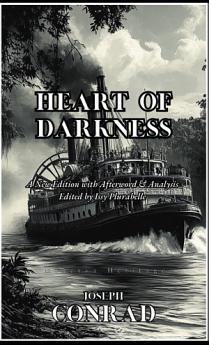Heart of Darkness
About this ebook
“Anything approaching the change that came over his features I have never seen before, and hope never to see again. Oh, I wasn’t touched. I was fascinated. It was as though a veil had been rent. I saw on that ivory face the expression of sombre pride, of ruthless power, of craven terror—of an intense and hopeless despair. Did he live his life again in every detail of desire, temptation, and surrender during that supreme moment of complete knowledge? He cried in a whisper at some image, at some vision—he cried out twice, a cry that was no more than a breath: “‘The horror! The horror!’
Joseph Conrad’s 1899 novella Heart of Darkness is a critique of European colonialism, framed as a layered narrative within a narrative. The story follows sailor Charles Marlow as he recounts his journey into the Congo Free State, then under King Leopold II’s exploitative regime, to retrieve Kurtz, an ivory trader whose ideals have warped into ruthless megalomania. Through fragmented, impressionistic prose, Conrad exposes the moral hypocrisy of imperialism, juxtaposing rhetoric of “civilization” with scenes of dehumanization and greed. The novella’s symbolism—darkness, fog, the river—serves as a metaphor for the ambiguity of morality and the psychological unraveling of those who wield unchecked power. While celebrated for its early anti-colonial stance, modern scholars critique its Eurocentric lens and marginalization of African voices, reflecting the era’s racial prejudices. Drawing from Conrad’s own traumatic voyage to the Congo, the work remains a cornerstone of postcolonial discourse and a precursor to literary Modernism.This modern edition of Conrad's classic novel includes a fresh Afterword, extensive reference materials including a timeline of Conrad's life and works, character glossary and group discussion questions on this literary classic. The text of the novel has been slightly edited to remove archaic terminology and make it more readable to the modern reader.
This novel is a voyage into the abyss where river currents whisper secrets and shadows breathe. Heart of Darkness is a fever dream of imperialism, where the Congo’s jungles coil like a primeval serpent around Marlow’s steamboat, swallowing light and sanity. Through veils of mist and madness, the myth of Kurtz unravels—a “civilized” genius turned ivory-cloaked tyrant, his soul gnawed hollow by greed. The air thrums with unseen horrors: skeletal natives, rusted chains, and the hollow chant of “Exterminate all the brutes!” As Marlow drifts deeper, the line between savagery and civility blurs; the river becomes a mirror reflecting humanity’s core, blackened by ambition. Kurtz’s final gasp—“The horror! The horror!”—echoes like a funeral bell for enlightenment’s lie. Conrad’s prose swirls, thick and suffocating, a chiaroscuro of colonialism’s rot. Not just a journey through a continent, but a descent into the labyrinth within—where every heart holds a darkness waiting to stir.
Set in the Congo Free State—a territory under the brutal private rule of Belgium’s King Leopold II—the story follows Charles Marlow, a sailor recounting his journey up the Congo River to retrieve Kurtz, an ivory trader who has succumbed to greed and megalomania. The novella exposes the hypocrisy of imperialist “civilizing missions,” highlighting exploitation, violence, and moral decay. Conrad employs impressionistic prose, prioritizing subjective perception over linear plot, and uses stark symbolism (e.g., darkness, fog) to explore themes of human corruption, existential isolation, and the fragility of civilization. While lauded for its anti-colonial critique, the work faces scrutiny for its Eurocentric perspective and dehumanizing portrayal of African characters, reflecting period racism. Rooted in Conrad’s 1890 Congo experiences, it remains pivotal in postcolonial studies and influenced adaptations like Coppola’s Apocalypse Now.











